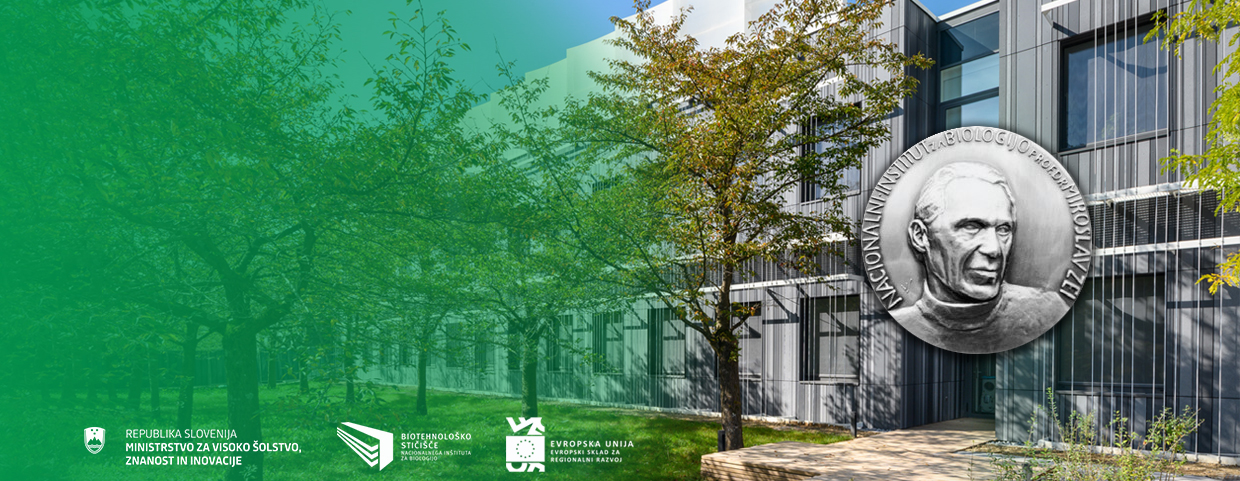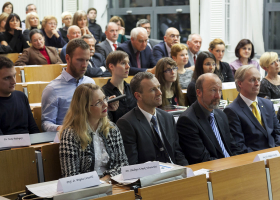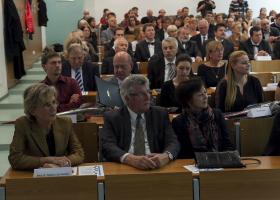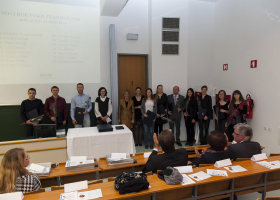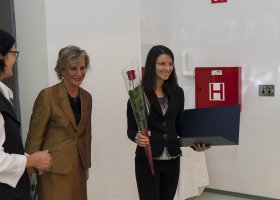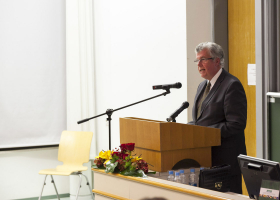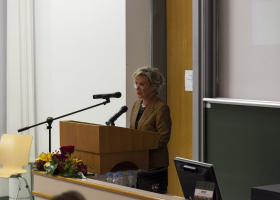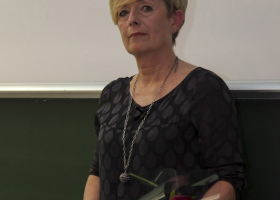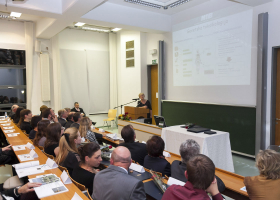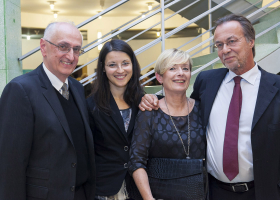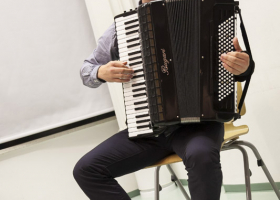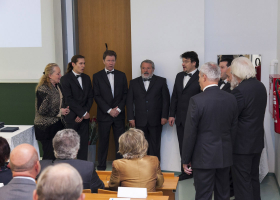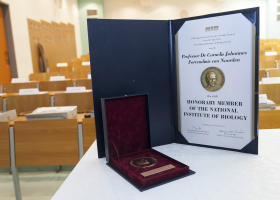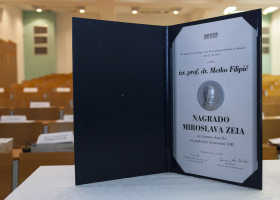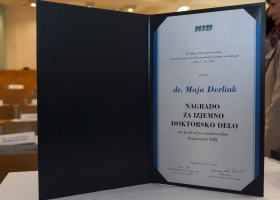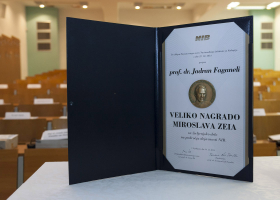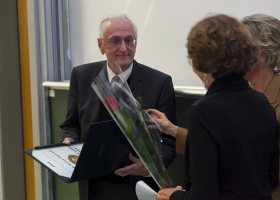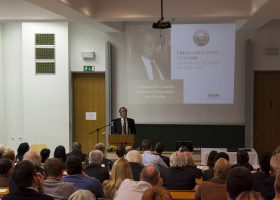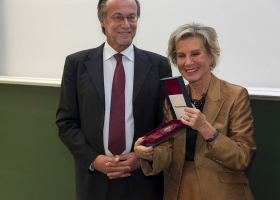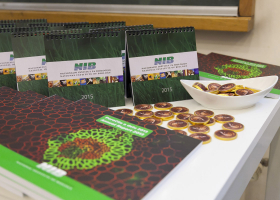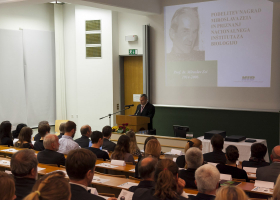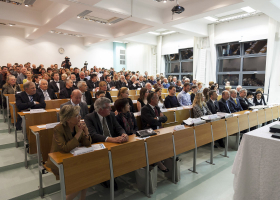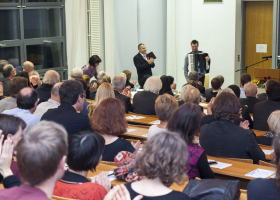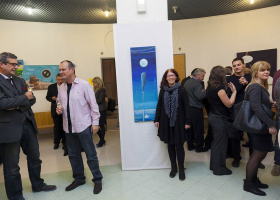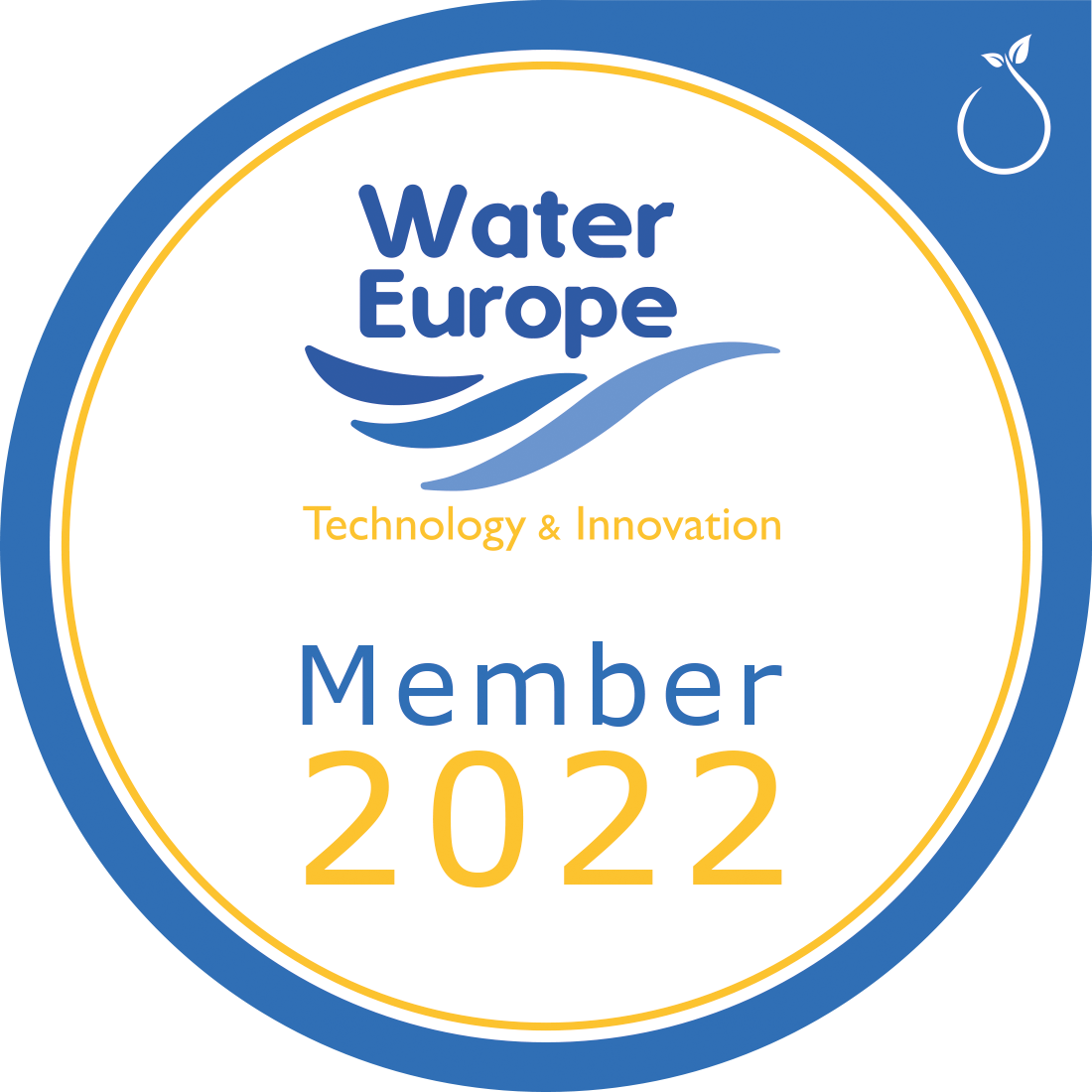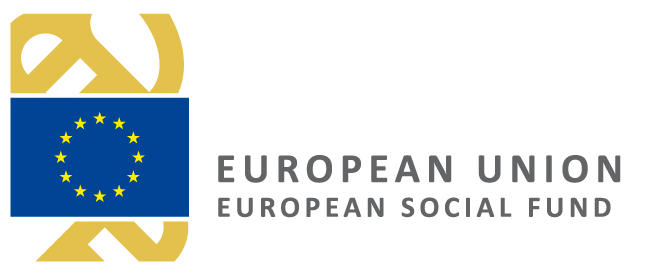28
Nov
Ceremonial presentation of the Miroslav Zei awards and awards of the National Institute of Biology
At the Biology center, located at Večna Pot 111 in Ljubljana, on Friday, the 13th of November, 2014, the fifth ceremonial presentation of awards and accolades in honour of Professor dr. Miroslav Zei, one of the Institute’s founders, was held to mark the 54th anniversary of the National Institute of Biology.
Professor dr. Tadej Bajd and the President of the Slovenian Academy of Sciences and Arts, Professor dr. Tamara Lah Turnšek, delivered speeches for event guests.
The following Miroslav Zei Awards were presented at the ceremonial event:
1) The 2014 Miroslav Zei Award for Life Work in the Field of the Activities of the National Institute of Biology was presented to Professor dr. Jadran Faganeli.
Professor dr. Jadran Faganeli is a top internationally acclaimed researcher of biochemical processes in seas, lagoons and even in high-altitude mountain lakes. His scientific interests cover a diverse range, and he brings together different research fields in his multi-disciplinary biochemical research projects. The diversity of his work can also be seen in his cooperation with experts from different fields, including biochemists, physicists, oceanographers, microbiologists, geologists and different profiles of biologists.
He was born in 1950 in Trieste. In 1974, he graduated from the Faculty of Natural Science and Technology at Edvard Kardelj University in Ljubljana. Five years later, he received his masters, and in 1984, he received his doctorate. His doctoral dissertation was titled “The Production and Transformation of Organically Bound Carbon in Coastal Waters (The Bay of Trieste).” After receiving his doctorate, he continued his studies in Gothenburg, Sweden. In 1999, he became a Full Professor at the University in Ljubljana. He has been a full-time employee of the National Institute of Biology since 1978. His work within the framework of the Institute takes place at the Marine Biology Station in Piran; since March 2004, he has also been employed as a Full Professor at the Faculty of Maritime Studies and Transport in Portorož.
In Professor Faganeli’s rich scientific career, it would be difficult to single out individual contributions to our mosaic of knowledge of the biochemistry of the Slovenian Adriatic coast and the north Adriatic. His scientific research in the past decade could be classified into three broad categories: biochemical transformations of mercury in coastal waters and lagoons, the composition and function of colloidal organic matter in the sea, with an emphasis on mucous macroaggregates, and the transformations of sedimentary organic matter in stratified Alpine lakes.
He has conducted research with eminent domestic and foreign scientists from various fields. Some of his more noteworthy collaborations include his exceptionally constructive work with Professor dr. Bojan Ogorelc and Professor dr. Milena Horvat and his work with Professor dr. Mark Hines from the United States and with Professor dr. Stefano Covelli from Italy.
His scientific opus is remarkable, and includes 122 original scientific articles and review articles, most of which were published in journals with an impact factor. Another indicator of the quality of Professor Faganeli’s research work is the exceptional impact of his publications in the scientific community. In the past decade, he amassed 1,168 direct citations, and the H-index for his publications is 19, something few researchers achieve.
Professor Faganeli is also an esteemed Full Professor at the Faculty of Maritime Studies and Transport in Portorož and in other units within the University of Ljubljana. His lectures primarily cover subject matter pertaining to environmental protection and biochemical processes in the sea. He has served as mentor or co-mentor to ten doctoral students and two master’s students and to over 40 undergraduate students at different universities both in Slovenia and abroad. A number of his students have gone on to become recognized and renowned researchers. He is the co-author of a text book and the author of numerous other learning materials used at the University of Ljubljana.
2) The 2014 Miroslav Zei Award for Exceptional Achievements in the Field of the Activities of the National Institute of Biology was presented to Associate Professor dr. Metka Filipič.
Associate Professor dr. Metka Filipič has been a member of the collective of the National Institute of Biology since 1996. Since 2005, she has served as head of the Department of Genetic Toxicology and Cancer Biology. In recent years, she has made a name for herself as a cutting edge scientist in the field of basic and applied genetic toxicology research.
Her research work covers:
- mechanisms for the genotoxic activity of cyanobacterial toxins, nanoparticles and mutagens that form in food at high temperatures;
- protective activity of matter of natural origin against the genotoxic effects of carcinogens found in food and the environment;
- mechanisms of the activity of the remains of cytostatics in the environment on non-target organisms.
Professor Filipič has published over 70 original scientific papers in journals with a high impact factor, three of which were review articles. Over the past five years, she published five articles in prestigious “A” journals and was the co-author of six chapters in monographic works.
She heads a number of national and international projects. Among the latter, the European CytoThreat project merits mention. The National Institute of Biology is a leading partner in this project in which researchers from seven European countries are taking part.
Professor Filipič is also highly innovative in developing new methods for determining genotoxicity. On the basis of her idea, she worked with co-workers from the Institute of Oncology to develop an alternative in vitro testing system for detecting genotoxicity. It is intended for testing new compounds in the pharmaceutical, cosmetic and food industries and for monitoring pollution in the environment. In 2001, this invention was awarded a patent by the Slovenian Intellectual Property Office.
She is also involved in teaching students in various undergraduate and postgraduate programmes. Under her mentorship, 30 students have received their bachelor’s degree and nine have received their doctorate.
As a member of scientific committees and as an expert, she is active in a number of Slovenian and foreign international organizations. She is also a member of several review boards, including those of the prestigious journals Mutation Research and Reviews in Mutation Research.
3) The 2014 Award of the National Institute of Biology for Exceptional Doctoral Work in the Field of the Activities of the National Institute of Biology was presented to dr. Maja Derlink.
Dr. Maja Derlink prepared her doctoral dissertation under the mentorship of Assistant Professor dr. Meta Virant Doberlet. The results of the doctoral dissertation, which was entitled “Vibration Signals, Reproductive Isolation, and the Origin of Species in the Aprodes Curtis, 1883 (Hemiptera: Cicadellidae) Genus”, have already been published in four scientific articles. Two were published in journals to which the Slovenian Research Agency has given an A1 rating; one was published in a journal with an A2 rating, and one in a journal with an A3 rating. Maja Derlink was also the first-listed author of two of these articles.
4) The Honorary Member of the National Institute of Biology Award was also presented at the ceremonial event. The National Institute of Biology awards this esteemed title to researchers who are not employed at the Institute, yet who, through their years of hard work, have contributed to its reputation and scientific excellence.
This Year’s Honorary Member of the National Institute of Biology Award was presented to Professor dr. Cornelis Johannes Forrendinis van Noorden.
The research path of Professor dr. Ron van Noorden spans 35 years of active work at the Department of Cell Pathology and Histology at the University of Amsterdam. He gained recognition as an expert in enzyme histochemistry and metabolic mapping. Over the past 25 years, he has applied quantification using image analyses to these research fields.
Professor Ron van Noorden’s cooperation with the National Institute of Biology began 15 years ago in the field of research of proteases in cancer and their role in tumour progression. Professor van Noorden regularly visits the Institute to conduct joint research and to consult the Institute in the field of proteases and also in the field of exotoxicology research of the characteristics of cyanobacterial blooms. Recently, he has been helping the Institute develop an animal model for zebrafish for use in cancer toxicology and biology. Additionally, he is generally a strong supporter and promoter of the Institute’s activities in the international arena.
5) Young peers of the National Institute of Biology who received a doctoral title in the period from the 1st of October, 2013 to the 30th of September, 2014 also received an Award from the National Institute of Biology:
- Dr. Chaichat Boonyanusith
- Dr. Dejan Bordjan
- Dr. Maja Derlink
- Dr. Neli Glavaš
- Dr. Andreja Kavčič
- Dr. Nataša Mehle
- Dr. Boris Petelin
- Dr. Marko Pezdirc
- Dr. Neža Podergajs
- Dr. Monika Primon
- Dr. Matevž Rupar
- Dr. Iva Talaber
- Dr. Jana Vojvoda
- Dr. Vera Zgonik
- Dr. Klemen Zupančič
Govor direktorice
Nagovor akad. prof. dr. Tadeja Bajda, predsednika SAZU
Photo: Žiga Ivanc

